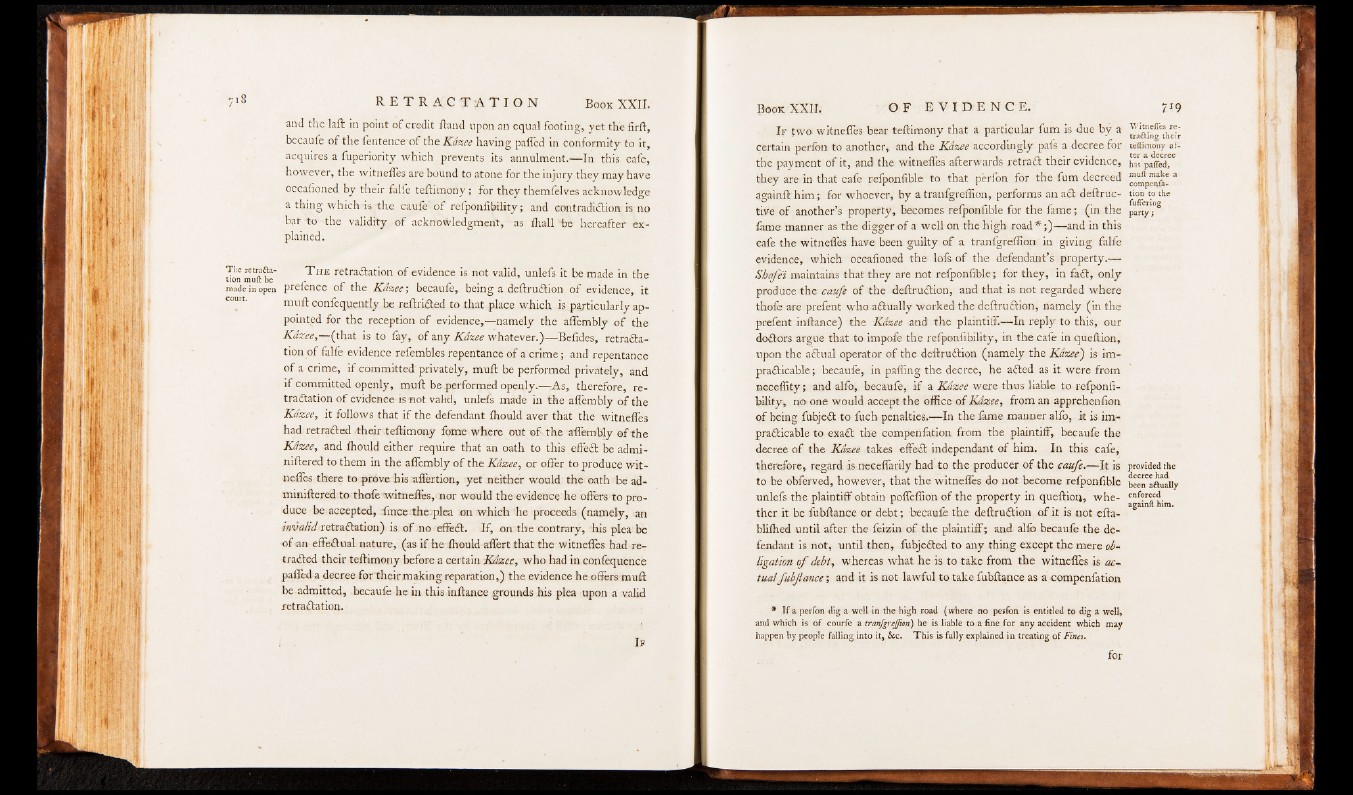
The retractation
mult be
made in open
court.
R E T R A C T A T I O N B o o k XXII.
and the laft in point of credit hand upon an equal footing, yet the firft,
becaufe of the fentence'of the Kdzee having palled in conformity to it,
acquires a fuperiority which prevents its annulment.— In this cafe,
however, the witneffes are bound to atone for the injury they may have
occalioned by their falfe teftimony; for they themfelves acknowledge
a thing which is the caufe'of refponfibility; and contradiction is no
bat to the validity of acknowledgment, as lhall -be hereafter explained.
T he retra&ation of evidence is not valid, unlefs it be made in the
prefence of the Kdzee; becaufe, being a deftruCtion of evidence, it
muft confequently be reftriCted to that place which is particularly appointed
for the reception of evidence,—namely the affembly of the
Kdzee,—-(that is to fay, of any Kdzee whatever.)— Befides, retractation
of falfe evidence refembles repentance of a crime; and repentance
of a crime, if committed' privately, muft be performed privately, and
if committed openly, muft be performed openly.—As, therefore, retractation
of evidence is not valid, unlefs made in the aflembly of the
Kdzee, it follows that if the defendant Ihould aver that the witneffes
had retraCted their teftimony fome where out of. the affembly of the
Kdzee, and Ihould either require that an oath to this effeCt be admi-
niftered to them in the aflembly of the Kdzee, or offer to produce wit-
nefles there to prove his affertion, yet neither would the oath be ad-
miniftered to thofe witneffes, nor would the evidence he offers to produce
be.accepted, rftnce the plea on which he proceeds (namely, an
zWa/zi/.-retraCtation) is of no effeCt. If, on the contrary, his plea be
of an effectual nature, (as if he fhould aflert that the witnefles had retraCted
their teftimony before a certain Kdzee, who had in confequence
palled a decree for their making reparation,) the evidence he offers muft
be admitted, becaufe he in this inftanee grounds his plea upon a valid
retractation.
I f
B o o k XXII. O F E V I D E N C E . 7*9
I f two witneffes bear teftimony that a particular fum is due by a
certain perfon to another, and the Kdzee accordingly pafs a decree for
the payment of it, and the witneffes afterwards retraCt their evidence,
they are in that cafe refponfible to that perfon for the fum decreed
againft him ; for whoever, by a tranfgreflion, performs an aCt deftruc-
tive of another’s property, becomes refponfible for the fame ; (in the
feme manner as the digger of a well on the high road * ;)— and in this
cafe the witnefles have been guilty of a tranfgreflion in giving falfe
evidence, which occalioned the lofs of the defendant’s property.—
Shafei maintains that they are not refponfible ; for they, in faCt, only
produce the caufe of the deftruCtion, and that is not regarded where
thofe are prefent who actually worked the deftruCtion, namely (in the
prefent inftanee) the Kdzee and the plaintiff.— In reply to this, our
doCtors argue that to impofe the refponfibility, in the cafe in queftion,
upon the aCtual operator of the deftruCtion (namely the Kdzee') is impracticable
; becaufe, in palling the decree, he aCted as it were from
neceflity; and alfo, becaufe, if a Kdzee were thus liable to refponfi-
bilify, no one would accept the office of Kdzee, from an apprehenfion
of being fubjeCt to fuch penalties.— In the feme manner alfo, it is impracticable
to exaCt the compenfadon from the plaintiff, becaufe the
decree of the Kdzee takes effeCt indépendant of him. In this cafe,
therefore, regard is neceffarily had to the producer of the caufe.— It is
to be obferved, however, that the witnefles do not become refponfible
unlefs the plaintiff obtain poffeflion of the property in queftion, whether
it be fuhftance or debt ; becaufe the deftruCtion of it is not efta-
blilhed until after the feizin of the plaintiff; and alfo becaufe the defendant
is not, until then, fubjeCted to any thing except the mere obligation
o f debt, whereas what he is to take from the witnefles is actualfubjlance
; and it is not lawful to take fubftance as a compenfetion
* I f a perfon dig a well in the high road (where no pesfon is entitled to dig a well,
and which is o f courfe a tranfgrejjion) he is liable to a fine for any accident which may
happen by people falling into it, & c . T h is is fully explained in treating o f Fines.
Witneffes retracing
their
teftimony after
a decree
has paffed,
muft make a
compenfa-
tion to the
fuffering
party;
provided the
decree had
been actually
enforced
againft him.
for